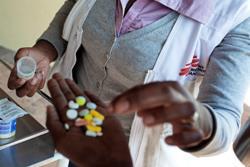Family intervention saves MDR-TB patient


Six months ago, Victor Mbuyane from Nkomazi about 100 kms east of Nelspruit was diagnosed with TB and put on a six-month course to treat it. He says he never felt the need to tell his family he had TB and continued drinking alcohol despite warnings.
Alcohol use while on TB treatment can increase treatment side effects affecting the liver and has been linked to people stopping treatment early.
After four months, he started feeling better and abandoned his pills, but soon got sick again. His mother, Zandile Ntuli said that the family started noticing changes in her son. He was losing weight and coughing up blood.
“We took him to the clinic, not knowing that he was already a TB patient and was on treatment that he hadn’t collected for several months,” she told OurHealth.
Health workers then also confirmed that Mbuyane also had multidrug-resistant TB (MDR-TB). Resistant to both of the most commonly used anti-TB drugs, MDR-TB often takes about two years to treat.
MDR-TB can be transmitted from person to person or can develop in patients who are unable to adhere to TB treatment. Mbuyane said he believes that his MDR-TB developed because he did not adhere to treatment.
“If I hadn’t stopped, I wouldn’t have MDR-TB,” said Mbuyane, who is currently on MDR-TB treatment and has stopped drinking. “No matter how hard it is to continue adhering to treatment, you must carry on, or it comes back worse the second time.”
He also said he regrets keeping his TB a secret. His mother is grateful that the family acted in time to help Mbuyane and prevent more family members from developing active TB.
When a patient is diagnosed with TB, close contacts such as family members should be traced and screened for TB – especially the elderly and children who are more at risk of developing active TB. Family members can then be taught about how to prevent further infections at home by, for instance, making sure windows are kept open.
While all TB patients are educated about the importance of treatment adherence, many default often because of alcohol, according to nurse Zodwa Zwane who adds that this may make social support for patients all the more important.
“Sometimes we recommend that patients come with a friend or a family member who will give his or her support… and make sure the patient takes the medication as prescribed until the treatment has ended,” Zwane told OurHealth.
Author
Republish this article
This work is licensed under a Creative Commons Attribution-NoDerivatives 4.0 International License.
Unless otherwise noted, you can republish our articles for free under a Creative Commons license. Here’s what you need to know:
You have to credit Health-e News. In the byline, we prefer “Author Name, Publication.” At the top of the text of your story, include a line that reads: “This story was originally published by Health-e News.” You must link the word “Health-e News” to the original URL of the story.
You must include all of the links from our story, including our newsletter sign up link.
If you use canonical metadata, please use the Health-e News URL. For more information about canonical metadata, click here.
You can’t edit our material, except to reflect relative changes in time, location and editorial style. (For example, “yesterday” can be changed to “last week”)
You have no rights to sell, license, syndicate, or otherwise represent yourself as the authorized owner of our material to any third parties. This means that you cannot actively publish or submit our work for syndication to third party platforms or apps like Apple News or Google News. Health-e News understands that publishers cannot fully control when certain third parties automatically summarise or crawl content from publishers’ own sites.
You can’t republish our material wholesale, or automatically; you need to select stories to be republished individually.
If you share republished stories on social media, we’d appreciate being tagged in your posts. You can find us on Twitter @HealthENews, Instagram @healthenews, and Facebook Health-e News Service.
You can grab HTML code for our stories easily. Click on the Creative Commons logo on our stories. You’ll find it with the other share buttons.
If you have any other questions, contact info@health-e.org.za.
Family intervention saves MDR-TB patient
by cynthiamaseko, Health-e News
April 9, 2014



